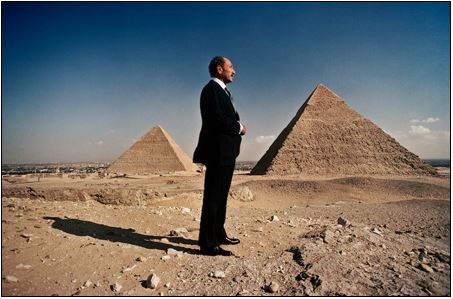 |
| Anwar Sadat at the Pyramids © David Hume Kennerly |
Bravery, honesty, loyalty, and others, all these were characteristics of former Egyptian president, Mohamed Anwar El Sadat. He was born on 25 December 1918 into a family of 13 children. His father was a government clerk and his mother Sudanese. He was named after Ismail Anwar, also known as Anwar Pasha, the Turkish war minister who was a Middle East war hero who held the city of Edirne during the Balkan wars in 1918, the year of Sadat’s birth.
Sadat had a happy childhood. He grew up among average Egyptian villagers in the town of Mit Abul Kom, Menufeya, which is 40 miles to the north of Cairo. Egypt was by that time a British colony. From an early time in his life, Anwar al-Sadat developed anti-colonial beliefs. Sadat was a devout Muslim from his early days, benefiting from an Islamic education. Later he joined the military school in Egypt. After his graduation, he was posted to a remote government base, where he met Gamal Abdel-Nasser. This was supposed to be the turning point of his life.
During the Second World War, Anwar El Sadat was imprisoned by the British because of the provocative help he offered to the Germans to expel the British from Egypt. However, he escaped two years later. In 1946 Sadat was rearrested, because of his entanglement in the assassination of a pro-British minister. He was released two years later. In prison, Sadat wrote a book called, In Search of Identity. Later after his release, he joined the "free officers' organization" which led a coup against the royal government of King Farouk in 1952, and he supported Nasser's election as Egyptian president in 1956. Upon Nasser's death in 1970, Anwar al-Sadat was elected president of Egypt.
One of his most important domestic accomplishments was the so-called "open-door policy": an approach that included decentralization of the economy, as well as opening Egypt to foreign trade and investment, which had a negative impact, including higher inflation and the uneven distribution of wealth. In foreign policy, Sadat made enormous efforts. Upon his ignored request to get more military support from the Soviets, he expelled advisers from Egypt. In 1973, he led Egypt through the 6th of October war, also known as the Yom Kippur War, to get back Sinai, which had been occupied by the Israelis since 1967. The Egyptian army managed to cross the Suez Canal, accomplishing a significant victory. For many years after, Sadat was known as the ‘Hero of the Crossing’. This war paved the way to further peace negotiations with Israel. "Peace is much more precious than a piece of land... let there be no more wars," was one of Sadat's quotes. This quote really shows how much he was interested in the Egyptian government. Three wars against Israel left Egypt struggling economically.
In 1978 Sadat made his most important diplomatic act: He visited Israel and addressed a speech to the Knesset. On March 26th, 1979, he signed the Peace Treaty with Prime Minister Menachem Begin in Washington, DC, United States. He also won a Nobel Prize for Peace. He wanted to initiate peace negotiations between Israel and Palestine, but unfortunately he never got the chance.
As a last act of heroism, he accepted hosting the ousted Shah of Iran when every other country on earth refused to. When the Shah died after a complication in a simple abdominal surgery, al-Sadat gave him an official funeral suitable for a leader of a big nation, risking his own life with the Islamic fundamentalists.
In Egypt, the controversial peace agreement with Israel generated opposition, especially among Muslim fundamentalist groups. On the 6th of October, 1981, during a parade celebrating the 1973 victory, Sadat was assassinated. He was succeeded by President Hosny Mobarak.
Anwar El-Sadat deserves to be called a hero for many reasons: He was the one who returned the Sinai Peninsula to Egypt in October 1973 after years of Israeli occupation. He also was the first Egyptian leader to take the bold action of visiting Israel, and thus created peace between Egypt and Israel after three exhausting wars, for which he received a Nobel Prize for Peace. Furthermore, he introduced Egypt to the "open-door policy", which allowed people from every social status to participate in the economy and trade. Anwar El-Sadat was a man of vision and strong will. He moved in life between extreme poverty, army positions, small private jobs and a statesman position. He spent time in prison, gaining a deeper understanding of himself. His understanding of world politics was quite ahead of his time for the region. In his race to accomplish his ambition, he risked his own life and finally lost it in 1981. I think, if he had survived a bit longer, he would have changed the political map of the Middle East.
Page created on 7/27/2009 12:00:00 AM
Last edited 7/14/2017 12:32:47 AM
